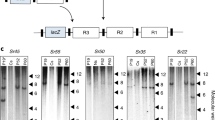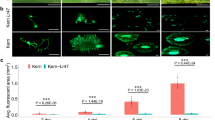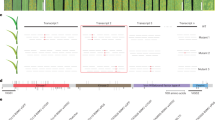Abstract
Eyespot disease, caused by the fungus Pseudocercosporella herpotrichoides, is responsible for considerable lodging and reductions of yield in extensive areas of wheat cultivation in North and South America, Europe, New Zealand, Australia and Africa1. The level of resistance of wheat cultivars is too low, even among the less susceptible ones (that is, Cappelle Desprez and Cerco) and no genes for resistance have to date been characterized in any species. Sprague2 found a high level of resistance to this disease in the wild grass Aegilops ventricosa and several workers have attempted its transfer to cultivated wheat with only partial success3–5. We report here a major dominant gene for resistance, which has been transferred from tetraploid Ae. ventricosa (genomes DvDvMvMv) to hexaploid wheat, Triticum aestivum (AABBDD), using tetraploid wheat, Triticum turgidum (AABB), as a ‘bridge’ species.
This is a preview of subscription content, access via your institution
Access options
Subscribe to this journal
Receive 51 print issues and online access
$199.00 per year
only $3.90 per issue
Buy this article
- Purchase on Springer Link
- Instant access to full article PDF
Prices may be subject to local taxes which are calculated during checkout
Similar content being viewed by others
References
Wiese, M. V. Compendium of Wheat Diseases, 46–47 (American Phytopathological Society, St Paul, 1977).
Sprague, R. J. agric. Res. 53, 659–670 (1936).
Maia, N. C.r. Acad. agric. Fr. 53, 149–154 (1967).
Kimber, G. J. agric. Sci. 68, 373–376 (1967).
Dosba, F. & Doussinault, G. in Proc. 8th EUCARPIA Congr., Madrid, 99–107 (eds Sánchez-Monge, E. & García-Olmedo, F.) (EUCARPIA, 1977).
Delibes, A. & García-Olmedo, F. in Proc. 4th Int. Wheat Genetics Symp., 161–166 (eds Sears E. R. & Sears L. M. S.) (Agric. Exp. Stn, Univ. Missouri, Columbia, 1973).
Delibes, A., Sánchez-Monge, R. & García-Olmedo, F. in Proc. 8th EUCARPIA Congr., Madrid, 81–89 (eds Sánchez-Monge, E. & García-Olmedo, F.) (EUCARPIA, 1977).
Delibes, A., Dosba, F., Doussinault, G., García-Olmedo, F. & Sánchez-Monge, R. Proc. 8th EUCARPIA Congr., Madrid, 91–97 (eds Sánchez-Monge, E. & García-Olmedo, F.) 91–97 (EUCARPIA, 1977).
Dosba, F. & Cauderon, I. Wheat Inf. Serv. 35, 22–23 (1972).
Jahier, J., Doussinault, G., Dosba, F. & Bourgeois, F. Proc. 5th int. Wheat Genetics Symp. (ed. Ramanujan, S.) 437–440 (Indian Soc. Genet, and Plant Breeding, New Delhi, 1978).
Dosba, F., Doussinault, G. & Rivoal, R. Proc. 5th int. Wheat Genetics Symp. (ed. Ramanujan, S.) 332–337 (Indian Soc. Genet, and Plant Breeding, New Delhi, 1978).
Delibes, A., Otero, C., García-Olmedo, F. & Dosba, F. Theor. appl. Genet. 60, 5–10 (1981).
Law, C. N., Scott, P. R., Worland, A. J. & Hollins, T. W. Genet. Res. Camb. 25, 73–79 (1976).
Author information
Authors and Affiliations
Rights and permissions
About this article
Cite this article
Doussinault, G., Delibes, A., Sanchez-Monge, R. et al. Transfer of a dominant gene for resistance to eyespot disease from a wild grass to hexaploid wheat. Nature 303, 698–700 (1983). https://doi.org/10.1038/303698a0
Received:
Accepted:
Published:
Issue Date:
DOI: https://doi.org/10.1038/303698a0
This article is cited by
-
Genetic dissection for head blast resistance in wheat using two mapping populations
Heredity (2022)
-
Strategies for utilization of crop wild relatives in plant breeding programs
Theoretical and Applied Genetics (2022)
-
Genomics-informed prebreeding unlocks the diversity in genebanks for wheat improvement
Nature Genetics (2022)
-
Mapping of flowering time, seed quality and clubroot resistance in rutabaga × spring canola populations and their association
Euphytica (2021)
-
The Aegilops ventricosa 2NvS segment in bread wheat: cytology, genomics and breeding
Theoretical and Applied Genetics (2021)
Comments
By submitting a comment you agree to abide by our Terms and Community Guidelines. If you find something abusive or that does not comply with our terms or guidelines please flag it as inappropriate.



